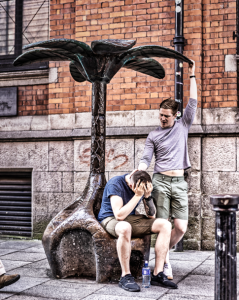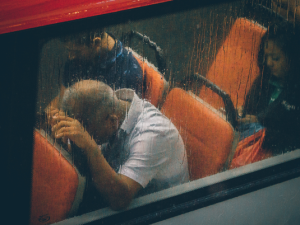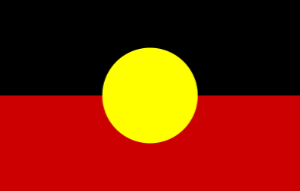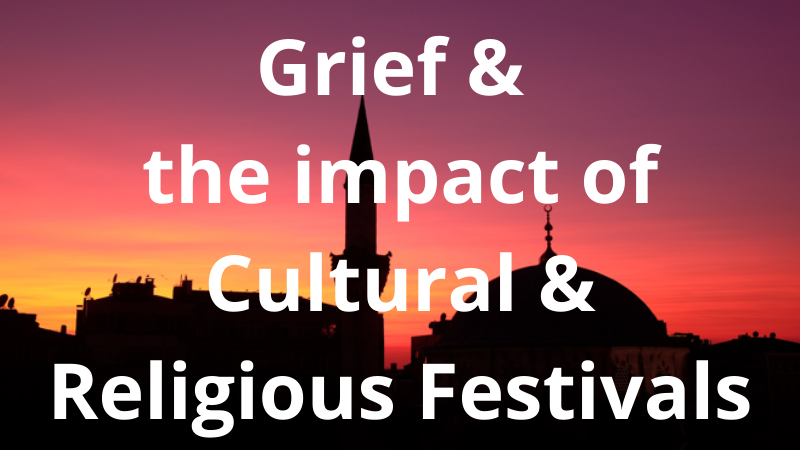Grief & the impact of Cultural & Religious Festivals
From now until the end of January the calendar is filled with dates of religious and cultural festivals around the world. For many people, these dates are anticipated with warmth and pleasure, while for others they are times that stimulate rushes of anxiety.
People who are lonely, worried, bereaved, sick, or wondering about missing relatives or friends, may wish they could hibernate until the images, sounds and smells associated with celebratory times fade or disappear. Pain, for any of us, whether acute or chronic, can feel more intense when we are confronted by what may have once given pleasure.
During our lifetime we are likely to experience pain at some time in all levels of our being – physical, emotional, mental and spiritual. The way we experience, interpret and respond will be determined by many factors – our inherent stamina, family modelling and expectations, gender, physical and mental health at the time, and the circumstances in which pain is generated.
Some folk seem to have a high pain threshold, others one that seems low; some tolerate physical pain but fear or respond badly to emotional pain, while others are the opposite. Pain is just pain. Most of us have a healthy desire to avoid or minimise pain on any level, and may have to remind ourselves that as undesirable as it may be, pain plays an important role in our lives. Pain is a warning system. It tells us when something is wrong, when we need to pay attention to our body, mind, emotions or spirit and ‘do something’, or stop doing something. We may need to take action, or remain still for a while.
Pain, especially short term pain, can be our friend, not our enemy. Chronic pain of course is another story.
The Pain of Everyday Life

The pain of frustration is familiar to us almost from the first days of our lives. Babies become frustrated when their meal isn’t delivered on time, their nappy changed quickly enough, or their boredom not relieved in seconds. Adults suffer the frustration of traffic jams, waiting at the end of a telephone to speak to a human voice about legitimate complaints, and a zillion other minor and major difficulties encountered in the process of living.
Physical pain can be a part of everyday life for many people, sometimes as simple as waking with a stiff neck after sleeping in a strange position, developing a nagging toothache, perhaps a headache and muscle aches that herald the onset of a heavy cold, or from tension caused by anxiety. Most of these problems are short term and can be solved when given the right attention.
As I sit at my desk in early October, I am aware of a mild kind of tension building in the air and mingling strangely with the smell of spring flowers. Despite the long standing annual nature of the problem, I still forget that I am prone to spring allergies and hay fever until a fit of sneezing reminds me.
October is my birth month, and the birth month of several people I love, including two I grieve. All of us felt privileged to have been born in early spring as Australia emerges in full colour from its approximation of winter drabness. Perhaps I am hyper sensitive to signs of stress at the moment because my youngest granddaughter is preparing to sit for her HSC. Despite her excellent academic record to date I know she is anxious, her tension palpable as she aims to achieve the results that will ensure a place in her desired university course. Other members of our extended family and friendship circle are in the same boat, the children and their supportive parents sacrificing social activities as they brace themselves for a final dash to the finish line. Celebrations that in the past have been experienced with enthusiasm and energetic animation have seemed more subdued, accompanied by promises of ‘we’ll make up for it next year’.
But, as uncomfortable as exam tension may be, it’s really just short-lived suffering tempered with the hope of a successful outcome. Similar to that experienced by athletes in the lead up to the Olympics, or professional sports people as they prepare for grand finals or significant trophies. The goal makes the suffering bearable, and sometimes noble.
Post match celebrations, post exam formals, end of year parties and various religious festivals will no doubt be opportunities for many to release emotions held in rein for the past year, or two, and any unpleasant memories will hopefully fade quickly into the background. Goal oriented pain usually involves choice, and is not disempowering.
Lasting Pain
Pain associated with chronic or life threatening illness, disability of any kind, bereavement, separation and divorce, serious loss from whatever cause, natural disasters or those deliberately created, losses that are not of our choosing, are likely to have a profound impact on all levels of our being and leave scars that last longer than the exam or training stress I mentioned.
As I write, vivid images of raging bush fires, recent and past, flash vividly across my mental landscape, filling me with empathic fear as I imagine being trapped, or desperately trying to save home, property, livestock and livelihood. The colour contrast and enormity of devastation viewed in the aftermath, looks as if the earth itself is in mourning.
People are grateful to have survived, some equally so to discover loved pets have escaped the flames, but the grief of all involved is palpable, and is likely to become more so as reality penetrates the protective barrier of shock. No matter what religious or philosophical beliefs have sustained people in their everyday lives to date, I imagine it will be hard to look forward to celebrations of any kind – religious or otherwise – as the year comes to an end.
Strangely, many of us tend to regard the end of the year as a kind of full stop to a sentence of suffering. How often have we said ‘I’ll be glad when this year is over. Fingers crossed next year will be better.’
Reading these words back to myself, I’m touched by their poignancy, by how young and vulnerable they sound, and by the sincerity of hope they contain. Hope is fulfilled often enough, and for enough people, for the words to live on as a familiar part of our personal language, and to be expressed in greetings to others. We send condolence cards, get well cards, cards pertaining to religious celebrations, text messages and email that express our hopes for the recipient that the coming year will be kind to them.
Guilt at times of Religious, Cultural and Social Celebration
If the past year has been kind to us, how do we allow ourselves to enter wholeheartedly into familiar rituals and celebrations with family, friends, and the wider community when we are acutely aware of the suffering of others?
Perhaps we could also ask ourselves ‘how could we not?’ If someone we love has died, we can enter into the occasion with that person in our hearts and minds as a way of honouring them and keeping them ‘in life’. If the person we care about is alive, but suffering physically, spiritually, or emotionally, we can use occasions of celebration to refill our emotional ‘tanks’ and remind ourselves that life contains many moments of joy. Those reminders can serve to re-energise us for the long haul of continuing care. Moments of joy are goals worth striving for.
A healthy amount of guilt keeps us sensitive, but too much disempowers us and renders us helpless to make positive contributions to the lives of others. At times like this, it can be helpful to unpack what I call the components of ‘guilt’. Guilt is not one of the ‘pure’ feelings like happiness, sadness, joy, or anger, but is a mix of two or more, and mixed together, they can become an emotional version of the familiar result we see when children mix all the colours in their paint tins together.
Unpacked, they may be a mix of fear and sadness, fear and anger, or fear, sadness and anger. Separated out from the pool of guilt, each of those feelings can be converted into action. If we are sad, we can grieve, and let the suffering person know that we feel sad about what they are experiencing. If we are angry, we can look at what changes we can make to their life, or to the life of the community. Anger can be a useful energy and may take the form of physically helping people to rebuild their lives, or of working to create social or political change.
Fear can also be converted into action that is constructive; we may decide to take notice of what our body is telling us and stop delaying medical advice that may save our life; we might make sure that fire alarms are installed in our homes and checked regularly; we may develop and memorise plans for emergency situations; or, if we fear the death of someone we love, we can make sure we make the most of every moment that we have tangible access to them. We can tell them what they mean to us, what they have contributed to our lives, and what we wish for them.
We need to enjoy what can be enjoyed and store the good feelings to use for ourselves, and others, in times of distress. A bit like squirrels storing nuts for the winter.
Living with Enduring Pain and Distress

Several people in the close family and friendship circle of my life are currently living with life threatening or chronic illness. Life is a struggle on a daily basis – struggling to deal with pain, fearing the future, and grieving for lost abilities and roles in life. Others in my circle are grappling with the pain of acute grief following the death of loved family members, and their grief often includes physical pain. As I write, I imagine that you, the person reading these words, may have people you care about who are living in similar situations.
Physical pain needs physical attention, and is usually best provided by competent professionals, or by relatives and friends with the guidance of professionals. However, we are all familiar with the fact that physical pain can be reduced or more easily endured if emotional needs are met.
When we are experiencing pain, most of us have similar emotional needs, which I’ll list for brevity and clarity. They are:
- To know that someone genuinely cares that we hurt, and will do all in their power to help us manage pain
- To feel connected to important people in our lives, and the wider world
- To find a role that gives meaning to our lives, even when our abilities have changed or are reduced
As caregivers, it isn’t very difficult to demonstrate the genuineness of our concern, or to help those in pain to access appropriate pain relief. Nor is it difficult to maintain connection with someone who is suffering – text messages can be invaluable and non intrusive; email allows for more detailed expressions of concern and for providing news updates for those who have access to a computer and the desire or ability to read; and snail mail, cards, and small gifts can all help to sustain connection and make the recipient feel valued.
Finally, and possibly most important, is for us to help those in pain find a role that gives meaning to their life. As grateful as any of us might feel for the care others provide when we are needy, we eventually feel inadequate or resentful if we can’t reciprocate in some way – if we can’t even the balance sheet. Most of us need to be care-givers as well as recipients of care.
My special friend Ann who I’ve mentioned in other Blogs, provided loving support for me and others, even when she was really ill, via text messages, phone calls, and visits when she was physically able. She never forfeited her caregiving role and knew she was contributing to life until she drew her last breath.
Another dear friend, currently involved in her own cancer battle, has done similarly, and her loving messages are like receiving a bouquet of flowers that warm the heart.
Even when we are ill, most of us are happy to be asked ‘I’m wondering if you’d mind helping me with…’. To have our knowledge and skills valued can be life enhancing.
The Holiday Season

Although several major religions and cultural groups celebrate significant calendar dates between now and the end of the year, in Australia we live in a predominantly Christian society which celebrates Christmas. Decorations, music and enticements to spend money begin all too early in my opinion, potentially diminishing the spiritual and family aspects of the season. Christmas is really ‘in your face’ for several months, and no matter what your religious belief, the ‘ho, ho, ho’ aspect can be overwhelming for those who are well, let alone the impact I imagine it might have on those experiencing pain on any level of their being.
New Year celebrations can have a similar effect, and are often particularly difficult for folk grieving the death of someone they love. The calendar rolling over into another year seems to draw a poignant line in the sand, highlighting the fact that another year has passed without that person’s tangible presence.
Ads on television are already reminding us that we are on countdown to the festive season, so what do we do? How do we manage our reactions?
Survival Plans
For anyone in pain, physical or emotional, it pays to think ahead and make a survival plan. We can begin by making a list of our resources: what people can we call on to help? what places provide a safe haven if we feel the need to hibernate for a few days? what places can we visit if we are afraid of being alone and need company and distractions? What distractions can we provide for ourselves?
However we plan to spend ‘the day’, or ‘days’, we need to build in the possibility of changing our mind at the last minute, which makes it obvious that if our plan includes others, they will need to be folk not easily offended by a change of plan – people who will understand our vulnerability.
It’s also a good idea to build into the celebratory occasion something different, something that acts like a circuit breaker to the well worn path of tradition. If we follow exactly the same routine, with exactly the same people, in exactly the same place, change – not of our choosing – is likely to be highlighted. As a result, rushes of feeling can surface out of our control, leaving us feeling extremely vulnerable. Change we have chosen ourselves feels different, and highlights the areas of our life where we still have control.
 The changes we choose can be simple – like the music we choose, or choose to omit, the colours we wear or use for decorations, the menu, people we include or exclude, the route we take when travelling, or the manner of travel. And, as my husband is wont to say, the value of avoidance is often underrated as a survival strategy. If a place, activity or person causes you unnecessary distress, opt for avoidance as your coping strategy.
The changes we choose can be simple – like the music we choose, or choose to omit, the colours we wear or use for decorations, the menu, people we include or exclude, the route we take when travelling, or the manner of travel. And, as my husband is wont to say, the value of avoidance is often underrated as a survival strategy. If a place, activity or person causes you unnecessary distress, opt for avoidance as your coping strategy.
For people who naturally express thoughts and feelings in writing, this may be a good time to share your experience in a journal, or write a letter, an email or a text message to someone you trust. If you are hesitant to burden family and friends with thoughts and feelings they may feel an obligation to ‘fix’, you can always write to the outreach service of ‘A Friends’ Place’.
Help
Help is always available – at ‘A Friend’s Place’ or by contacting our outreach service.
Dianne McKissock OAM
NCCG Outreach Support Service
Email support for dying and bereaved people and anyone involved in their care






